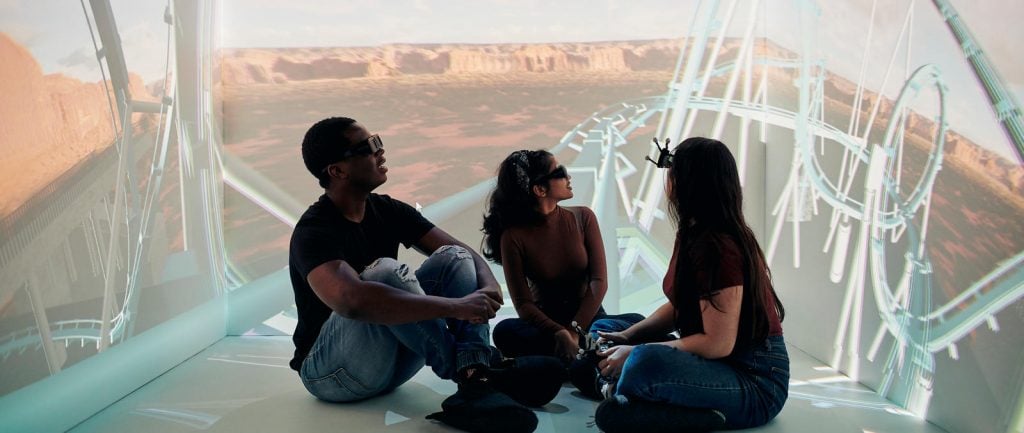Research Projects

Australian Research Council Discovery Early Career Award DE200100898 – $421,979
Information Embodiment Framework for Education using Immersive Technologies: The project aims to develop a framework to apply mixed reality technologies in education, by fusing the information with human physical, physiological, cognitive and emotional perceptions. The current approach translates existing contents into 3D which does not scale and causes cognitive overload. The project conceptually advances the design and development of mixed reality applications. Expected outcome is a mixed reality integration framework for effective communication, applicable to manufacturing, health, tourism and arts. The benefits are enhanced learning with engaging resources, with positive impact on student learning outcome and motivation, in both formal and informal education settings such as schools, galleries, and museums.
Learning English as a Second Language in Interactive Virtual Environments with Avatars – $150,000
This industry funded project investigates how situated learning pedagogy can be usefully adopted when designing an interactive virtual environment for learning English as a second language, and how a blended learning space can enhance learning experience and outcomes. Problem: The limited resources and situations for people to practice English, in particular for people off-shore but planning to come to Australia, are major obstacles that this project is aiming to address. Our solution: A proof-of-concept (PoC) prototype application is being designed and developed to facilitate learners to learn English in 3D interactive environments. Outcome: (a) successful industry grant (b) a conference paper was published and won the “best paper” award in ETLTC2021. Impact: Continuous industry engagement and commercialisation potentials.
An Evaluation of Virtual Reality for Fear Arousal Safety Training in the Construction Industry – $20,000
Occupational Health and Safety is a significant area of concern for the construction industry, in which subcontractors work across multiple sites with varying safety induction and training. Prior work in applying immersive technologies for safety training often focuses on the simulation of working sites for hazard identification, demonstration of safety practice, and knowledge-based safety tests. However, it has been identified that current safety training is largely ineffective in improving workers’ attitudes towards safe work practices. We apply a fear-arousal approach to safety training by simulating the experience of different types of common safety accidents on a construction site in virtual reality. We conducted an evaluation with workers, contractors, and employees of a commercial construction company, where each participant experienced safety incidents on a virtual construction site. We applied pre- and post-testing measures on the impact on safety attitude and learning practice. We present the empirical evidence of fear arousal safety training in VR for improving the safety attitudes of construction workers, subcontractors, and employees. We suggested improvements and design considerations for other researchers, designers, and stakeholders in this domain based on our findings. This project is led by Deakin Motion Lab.
An Evaluation of Virtual Reality Maintenance Training for Industrial Hydraulic Machines – $250,000
Virtual reality applications for industrial training have widespread benefits for simulating various scenarios and conditions. We present an empirical evaluation of VR training approach using kinesthetics learning strategy in industrial maintenance training, specifically the hydraulic manufacturing industry. Through our collaboration with a leading industry partner, a remote multi-user training platform using head-mounted display was designed and implemented. We present the evaluation of the platform with two diverse cohorts of novice users and industry contractors, in comparison to traditional training using slides, photos, and videos. The results show that VR training is engaging and effective in boosting trainee’s confidence, especially for novice users. Our studies highlight the impact of virtual reality training on trainee experience, performance, and skills transfer, with reflections on the differences between novice and industry trainees. This project is led by Deakin Motion Lab.
A Spatially Intelligent Arts Centre
The project’s motivation to develop a spatially intelligent building is due to its potential to respond to various threats, such as the current pandemic, as well as opportunities it offers to enable new forms of content creation and sharing for the Arts & Culture Industry. To that end, “intelligent building” is interpreted through two distinct, yet complementary, lenses. One focuses on the operational side of an Arts Centre Building, to explore opportunities to sense, capture and analyse patron activity and movement, to provide practical safety messaging and other opportunities to program the building systems to respond to changing conditions in real-time. The other focuses on the creation of new social, spatial and experiential interactions, distribution channels and consumption modalities (e.g. participation, immersion), through the use of ubiquitous computing. The project ultimately aims to develop tangible prototypes to enable new and hybrid models of sharing culture. This project is led by MInD Lab.
[feedzy-rss feeds=”https://dro.deakin.edu.au/list/?cat=quick_filter&search_keys[core_3]=thuong+hoang&search_keys[core_26]=7024&tpl=2″ offset=”0″ feed_title=”yes” refresh=”12_hours” lazy=”no” summary=”yes” keywords_inc_on=”title” keywords_exc_on=”title” price=”yes” columns=”1″ ]